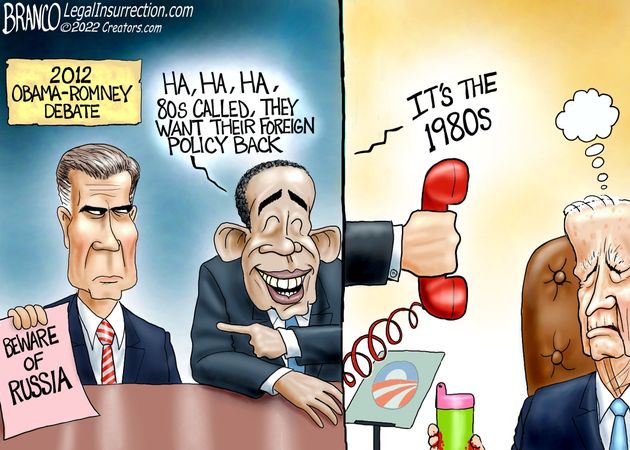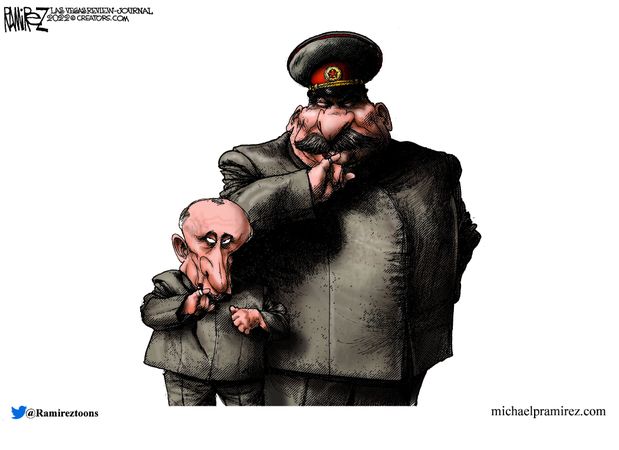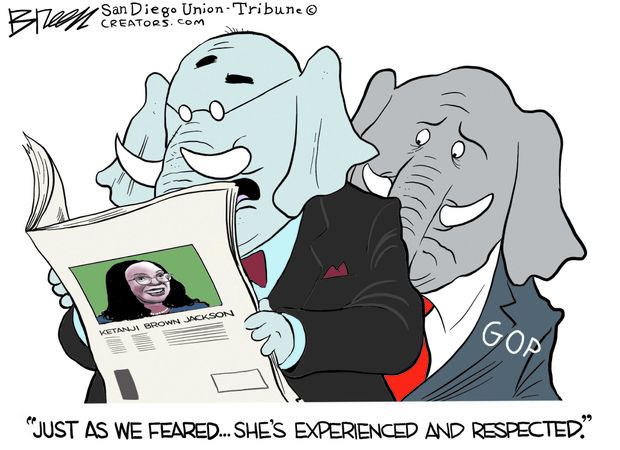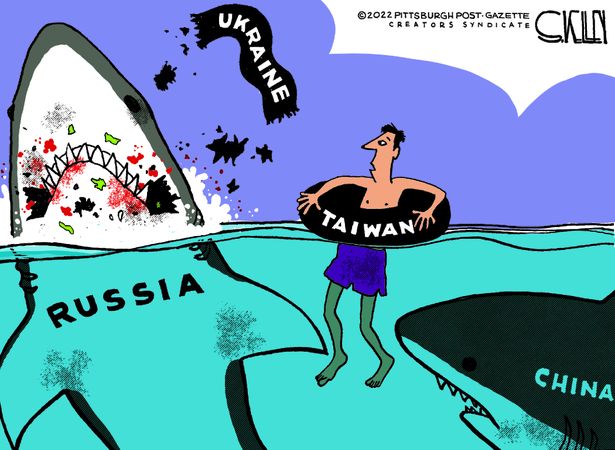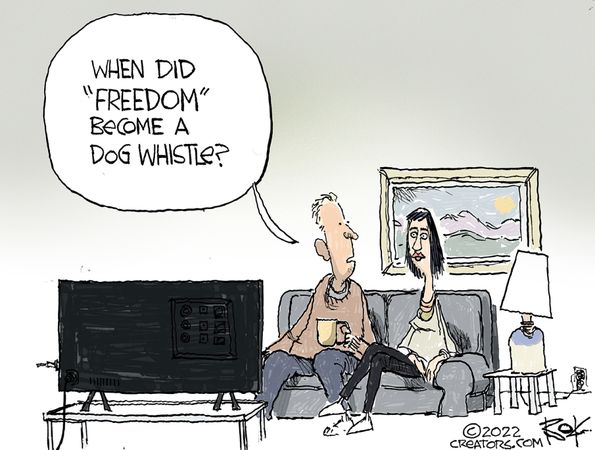As a Never Trumper even before Trump's announcement of candidacy for the 2016 GOP POTUS nomination, I really didn't want to probe into the whole Russiagate kerfuffle again. I've never understood his fixation with authoritarian figures and his quixotic obsession with Russia and Putin in particular. His very recent media appearance is a classic case in point: Trump is quick to attribute the current Ukraine crisis to Biden's incompetence, which would never have happened on Trump's watch (pure hubris; Putin had invaded Ukraine before Trump's Presidency) . He labels Russian troops as "peace keepers" and Putin's unilateral recognition of 2 Ukrainian territories as independent Trump sees as "genius". I'm not exactly sure why Trump is engaging in this rubbish; Putin's meddling in Ukrainian affairs is non-defensive, and his use of military force is morally unjustifiable and a violation of international law. Trump's motives may be little more than his signature seeking attention and to reassert his relevance and perhaps an attempt to provoke a reaction from his political adversaries and galvanize his own political base.
I don't know if I ever succinctly wrote my take during the whole Russiagate kerfuffle. I think Trump is not well-disciplined; he has a narcissistic personality and is a publicity whore (as in "there is no such thing as bad publicity"): he likes to stir the pot, to provoke outrage, to do the unexpected. He wants to manipulate the situation so his opponent is off-balance, on the defensive, playing by Trump's rules. Among other things, he can exploit mistakes made by his opponent, and he can deflect his opponent's attack. I don't know the full story of Russia's issues with Hillary Clinton; perhaps it dates back to Bill Clinton's Presidency when Clinton pushed for NATO expansion in the aftermath of the USSR collapse, not to mention Clinton's intervention against Serbia, a traditional Russian ally. Maybe Russia also had their own issues with Hillary Clinton during her own stint as Obama's Secretary of State. It may be that Russia and Trump found each other politically useful: "the enemy of my enemy is my friend." We don't necessarily need a quid pro quo here. It's just a jointly opportunistic set of circumstances.
Why Trump played the Russia angle, e.g., explicitly asking Russia to find/release Hillary's infamous missing emails. is unclear. The GOP has traditionally been cool to Russia: "“All of these people came up in a party where standing up tough against
Russia was a prime directive,” Doug Heye, a longtime GOP strategist, said of the divide." In fact, just 4 years earlier, nominee Romney listed Russia as our top foreign adversary. I have hypotheses: e.g., he was trying to signal to his base and others he was a true outsider, thinking outside the box: he was not Romney, and this is not your grandfather's GOP. He was different and embodied change to frustrated voters. Bipartisan apathy to Russia is part of the "swamp". A second reflection is the email kerfuffle, a serious error in judgment where Clinton violated government policies, including classified data. (Cleared personnel knew the distinction between the NIPR and SIPR, and often have different email accounts; devices like cellphones (with camera functionality, among other reasons) generally have to be stowed before entering a classified facility.) Government cybersecurity was not involved in maintenance of Clinton's email security. Now I seriously doubt Trump, who left the White House with classified documents in his moving boxes, other records found in plumbing, etc., understood the nuances of Clinton's misconduct, presumably for the sake of convenience; certainly what he did in destroying or taking White House documents on leaving office was intentional in nature (he had been briefed on the Presidential Records Act), more serious, and hypocritical; an argument can be made that vulnerability of the Clinton servers to rogue criminal hackers (including those who might sell information to foreign adversaries) was more troublesome, although I don't know (doubt) if the US government has a role in vetting Trump's household staff or others with access to the documents Trump stole on leaving office.
It's possible that Trump saw Clinton's email misconduct as symptomatic of double standard elitist behavior underlying the DC swamp; granted, his own Presidency was one of thinking himself above the law, but it wasn't on the record in the 2016 campaign. But like Trump's reboot of the Obama birth certificate conspiracy rubbish, I think this was more of an attempt to exploit Clinton's vulnerability on the issue and her high unfavorability rating, a juvenile tactic to get under her skin, to get her on the defensive. Asking the Russians to hack the Clinton server in the hopes of recovering national secrets, to me was a step too far: this is the same guy who wanted Edward Snowden killed. (And what country is hosting Snowden?) Trump would later try to deflect criticism by disingenuously claiming his asking Russia for help in recovering missing Clinton emails was just a joke.
I'm not sure why Trump wasn't more disciplined to minimize the appearance of high-level Russia connections during the campaign. He was playing with fire and had to know it. He has a streak of stubbornness and dug in his heels. He asserted his campaign contacts were innocuous and seemed indignant others didn't take his word for it. But the fact is, the Russia kerfuffle was an unforced error on his part, and his desperate attempts to stonewall investigations, abusing Presidential authority, exacerbated the situation.
I never personally bought into the Russiaphobic conspiracies over Clinton's unexpected loss. Clinton had narrowly won her nomination over Comrade Bernie over and beyond her own high unfavorables. She only had a 3.3 point lead nationally (not necessarily in battleground states) with an ambivalent divided party base in a change election year. The results were not manipulated by Russian principals, who did not have access to election voting systems. The idea that Russian operatives on a shoestring social media budget somehow manipulated Facebook users to swing the election was patently absurd. The fact is Clinton had a far larger campaign budget, and Big Tech was solidly behind Clinton. I write as someone who voted for LP nominee Johnson, not Trump or Clinton.
I'm not going to go into the sorry history of his attempts to stave off investigations by firing Comey, Sessions and others and even threatening Mueller and impeding his investigation. Trump's behavior was self-serving, grossly unethical, illegal and unconstitutional. He wasn't/isn't above the law. His behavior was counterproductive; to the impartial observer "where there's smoke, there's fire". Mueller eventually found little evidence behind the Russiaphobe hypotheses, but Trump's behavior impeding the investigation was legally troubling.
Trump wasn't satisfied with the Mueller exoneration and wanted his pound of flesh, going after those who had brought so-called evidence behind alleged collusion of the Trump campaign and Russia. AG Sessions replacement, Barr, named John Durham to head the special investigation in 2019.
So far Durham's investigation has been a nothingburger; 3 indictments: Sussmann, a cybersecurity lawyer tied to high-profile Dem clients, charged with lying about his status to a key FBI counsel; Clinesmithan, an FBI lawyer who reportedly doctored an email referencing Page, a former Trump campaign adviser; and Danchenko, a Russian immigrant charged with 5 counts of lying to the FBI. Probably Sussman has been the most notorious; at the risk of oversimplification, Trump and/or his entourage allegedly used Russian-made phones with purported "phone home" links to Alfa Bank, a highly-connected Russian lender, and there was "strong" evidence of such traffic. (The Mueller investigation dismissed this allegation on the basis of inadequate evidence.)
The recent Durham filing doesn't really break new ground, other than to expose that some of the evidence of DNS lookups came via a tech company with an existing DNS services contract with the Executive Office of the President during Trump's first year in office.
I usually don't quote Trump (and it took a while to find this quote on the recent Durham filing on a search engine)
The latest pleading from Special Counsel Robert Durham provides
indisputable evidence that my campaign and presidency were spied on by
operatives paid by the Hillary Clinton Campaign in an effort to develop a
completely fabricated connection to Russia. This is a scandal far
greater in scope and magnitude than Watergate and those who were
involved in and knew about this spying operation should be subject to
criminal prosecution. In a stronger period of time in our country, this
crime would have been punishable by death. In addition, reparations
should be paid to those in our country who have been damaged by this.
One of the things that triggered the writing of this post is Trump's incompetence and distortion of the nature of the filing. Most of this is his complete ignorance of technology, including the function of a DNS server; I, a former IT professor and also certified Security+, will discuss this subject shortly. .
No, There was no evidence of "spying"on Trump or anyone else part of the Executive Office of the President:
The use of the term “executive office of the president” also does not seem to imply that White House servers or Trump himself were directly monitored by Joffe’s efforts. The White House website defines the term not as a physical location such as the Oval Office but as the “home to many of the President’s closest advisers” that “are constantly shifting as each President identifies his or her needs and priorities.” The EOP includes the White House Communications Office and Press Secretary’s Office, the White House Military Office, and the Office of Presidential Advance. The site notes that “many senior advisors in the EOP work near the President in the West Wing of the White House,” but “the majority of the staff is housed in the Eisenhower Executive Office Building.”
The implication of wiretapping is false. There has been no charge against Joffa, the tech executive who mined relevant DNS data for Sussmann, no charges against the Clinton campaign, etc. Durham himself has distanced himself from post-filing Trumpkin hype:
According to The New York Times, Fox News' reporting explained
details about Durham's motion which suggested former Democratic
presidential nominee Hillary Clinton's campaign was secretly surveilling
the Trump White House servers. But now, however, Durham actually
refuted those reports, himself.
On
Thursday, February 17, the special counsel's team wrote a statement in
its court filing. “If third parties or members of the media have
overstated, understated, or otherwise misinterpreted facts contained in
the Government’s Motion, that does not in any way undermine the valid
reasons for the Government’s inclusion of this information,” Durham’s
team wrote.
And again here:
There are key differences between Trump’s claims [wiretapping and Obama] and Durham’s allegations. First, the use of “Obama” implies government action since Obama was president at the time. So far, Durham’s investigation has not uncovered any criminal wrongdoing or illicit surveillance by the FBI or other federal agencies.
No, there was no conclusion that the purported Russia links were "completely fabricated"; first of all, It was Mueller who investigated the merits of the Trump/Alfa Bank connection and concluded it had not found evidence in support of the allegation. It's a different thing to conclude it's a fabrication. It may simply be little more than a poorly vetted rumor. After all, Trump has had dealings with other foreign banks (e.g., Germany and China). Or perhaps Mueller's investigation was limited in scope and didn't stumble across the evidence for resource reasons.
[It could be Trump is referring to this:
Alfa Bank’s
owners — Petr Aven, Mikhail Fridman and German Khan — have filed two
lawsuits naming “John Doe” as the defendant. Their filings include
reports by two cybersecurity firms that contend Alfa Bank was the victim of hackers. The hackers sent fabricated Domain Name System (DNS) digital queues to Trump domain “mail.trump-email.com” to make it look like they were communicating with Alfa servers, the lawsuits say.
I don't believe this is relevant to the Joffe-based evidence; I don't know if the FBI has validated Alfa Bank's claims or identified the hackers and their links, say to Sussmann or the Clinton campaign. For one thing, Joffe's data mining ran from 2014 to 2017, much of that time before Trump was a Presidential nominee and after the election (which would not have helped the Clinton campaign).]
A "scandal far greater in scope than Watergate"? Not even close. On the other hand, Trump, in trying to obstruct the Mueller investigation, was definitely flirting with Nixonian obstruction of justice. I'm sure in thin-skinned Trump's view, any adverse opinion is the worst offense possible. There have been lots of dirty political tricks in American history; I don't think an allegation about Trump ties to Russia merits among the worst. Trump exaggerates everything--greatest economy ever, etc. There's no evidence here of a "Deep State conspiracy". Sussmann was not a government employee; his evidence was debunked by the FBI.
The sole indictment of a government employee was an FBI lawyer who pleaded guilty to one count of altering an email. Kevin Clinesmith was sentenced to probation and community service after explaining that he believed his edit to be true.
There are key differences between Trump’s claims and Durham’s allegations. First, the use of “Obama” implies government action since Obama was president at the time. So far, Durham’s investigation has not uncovered any criminal wrongdoing or illicit surveillance by the FBI or other federal agencies.
"Pro-life" Trump wants those responsible for his Russiagate "persecution" to die and he also wants damages (from the antagonists or US taxpayers?).
Now, going beyond the Trumper Tantrum:
The major point of the filing didn't have to do with charges but with the legal process and avoiding conflicts of interest in defense counsel:
[T]he law firm Latham & Watkins LLP, which represents Sussmann, may
have a conflict of interest due to the other sprawling facets of
Durham’s probe.
The Government has discussed these matters with the defense and believes
that any potential conflicts likely could be addressed with a knowing
and voluntary waiver by the defendant upon consultation with
conflict-free counsel as appropriate. The Government believes that any
such waiver should be put on the record prior to trial. As set forth in
further detail below, it is possible that conflicts of interest could
arise from the fact that Latham and/or its employees (i) previously
represented others in the Special Counsel’s investigation whose
interests may conflict with those of the defendant, (ii) previously
represented the defendant and his prior employer in connection with
events that likely will be relevant at trial or at any sentencing, and
(iii) maintained professional and/or personal relationships with
individuals who could be witnesses in these proceedings. Accordingly,
for the reasons set forth below, the government respectfully requests
that the Court inquire into the potential conflicts of interest set
forth here
Now let's talk about DNS (domain name system). At the risk of oversimplification, computers have IP's, period-separated numerical (digital/hexadecimal) address ID's: we often connect to other PCs/servers/services not by their IP's but by more user-friendly domain names referenced in a URL, e.g., gmail.google.com. The routing on actual communication between computers can be complicated for purposes of target system performance or availability (e.g., load balancing and more local caching), but basically DNS servers with one's ISP facilitate the coordination of traffic over the Internet.
Here's an example of steps in a DNS lookup:
- A user types the URL example.com into their web browser.
- The user’s computer sends a request to the recursive resolver.
- The recursive resolver then sends a request to the root
nameserver which provides the address of the TLD nameserver responsible
for .com domain names.
- The root nameserver returns the result of the TLD nameserver to the recursive resolver.
- The recursive resolver sends a request to the .com TLD
nameserver which provides the address of the authoritative nameserver
responsible for the example.com domain.
- The TLD nameserver returns the result of the authoritative nameserver to the recursive resolver.
- The recursive resolver sends a request to the authoritative
nameserver responsible for example.com which provides the DNS records
requested.
- The authoritative nameserver returns results to the recursive resolver.
- The recursive resolver returns DNS records containing the IP address to the browser.
- The browser makes a request directly to the IP address of the server hosting the website.
There are online archives of up to trillions of DNS lookup records.Joffe's then company (Neustar) (the Gray Lady identified him) had an existing White House contract to provide DNS services when Trump took office. (I don't have the specifics of the cybersecurity services provided. I do know there are proxy servers with URL filtering on government networks, and users are warned of possible monitoring of their activities on the network. For example, a number of businesses may want to keep employees from sexual content, gambling or other objectionable sites, say, infested with malware.) I do not know if the relevant DNS lookups Joffe did for EOP were authorized under the scope of Neustar contract; if Alfa Bank is Kremlin-linked, it might have been. There are other network monitoring tools that could emulate Trump's paranoid delusion of spying on government networks, but Joffe's data mining of DNS lookup archives is not.
As I discussed above, the significance of Joffe's results over 2014-7 were over-hyped by Sussmann; I saw one tech writer estimate his large family's email lookups alone over the time period were comparable in nature, never mind other Internet activity.
Finally, transparency of public service in our democratic republic is fundamental in fostering accountability. Trump has personalized the freedom of the press (e.g., targeting Amazon CEO Jeff Bezos, owner of WaPo), although all Presidents have had similar challenges. He inflates the enumerated powers of the Presidency, exaggerates his "accomplishments", and then is furious when others debunk his rubbish. I'm glad that Trump's unconstitutional abuse of foreign relations authority in attempting to extort Ukraine President Zelensky into opening an investigation of then VP Biden was revealed in a call transcript. Of course Trumpkins tried to demonize the leaker of Trump's misconduct. Then there was the expose of Trump's 2020 phone call with Georgia Secretary of State Brad Raffensperger, where he demanded that the latter reverse the election's results, a shockingly illegal, unconstitutional, unethical breach of authority. Trump is furious when his behavior comes under public scrutiny. I'm sure he regrets Alexander Hamilton's dream of an elected king didn't survive the Constitutional Convention. I seriously doubt that twice-impeached Trump will match Grover Cleveland's nonconsecutive terms as POTUS.
